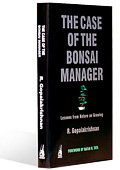 |
THE CASE OF THE BONSAI
MANAGER
By R. Gopalakrishnan
Penguin
Pp: 263
Price: Rs 450 |
Peter Drucker, reputed
to be the greatest thought leader in management in the last century,
was also a consultant to CEOs of large corporations. Drucker would
never ask any executive for facts first, but always begin by asking
for his opinion. The reason: Any executive worth his salt could
find facts to support his opinions, he would say. Beliefs, as
also the opinions based on those beliefs, were primal in the way
human minds work, Drucker suggested.
Talking to business graduates recently, Jack Welch, considered
to be amongst the best CEOs of the 20th century, said that their
schooling in management would actually begin when they leave school
and enter the real world. This is so because management as taught
at business schools, with its overemphasis on facts and their
analysis, has become increasingly divorced from the practice of
management in the real world. Jeffrey Pfeffer of Stanford University
points out that the curricula of business schools narrow the thinking
process of students rather than broaden it as good education should.
R. Gopalakrishnan explains in his mind-opening book that a bonsai
is a stunted tree whose natural processes have been curbed. Managers
who rely only on analysis and facts, and suppress intuition (which
flows into beliefs and opinions) are like bonsais. Business schools
all over the world are beginning to recognise the limitations
in their curricula, and many are seeking ways to develop the social
skills of their students and teach them ethics and values-based
management-the 'soft' skills that matter more in real life than
the analysis of hard numbers. For these business schools and for
business managers everywhere, Gopalakrishnan's book is very timely.
Gopalakrishnan makes the case for intuition. More importantly,
he eloquently explains how intuition is developed. He uses analogies
with animals and birds to explain insights into intuitive intelligence.
His language is evocative and jargon-free and his images, memorable.
What's more, he grounds all his insights in real life managerial
situations, many of which are from his own rich and successful
career with Lever and Tatas. Amongst other managerial situations
that he recounts, one that I found particularly insightful is
B. Muthuraman's account from his own diaries of decision-making
processes and churning emotions when he was immersed in Tata Steel's
Gopalpur steel project that never took off.
Ratan Tata's foreword and Gopalakrishnan's concluding paragraphs
of the book are a ringing endorsement of values-based management.
The Case of the Bonsai Manager is one of the most refreshing and
useful books on management that I have read in many years. I hope
many managers will read it and that it will be taught in business
schools.
(Arun Maira is Chairman, Boston Consulting
Group India)
 |
|
BOTTLED FOR
BUSINESS
By Karan Bilimoria with Steve Coomber
Wiley India
Pp: 169
Price: Rs 299
|
What do you do after you have built
a £100-million beer empire from scratch? Of course, tell
the world how you did it and how other entrepreneur wannabes could
do it, too. Bottled for Business takes readers inside the business
philosophy that helped turn Karan Bilimoria from a freshly-minted
law grad with £20,000 in student debt to a high-profile
entrepreneur in the UK. So what in Bilimoria's opinion makes a
good entrepreneur? A handful of qualities, says the son of an
officer in the Indian Army. The ability to be creative and to
go the extra mile, self-confidence, hard work, foresight, discipline,
and (here's a tricky one) luck. But, then, you wouldn't be a very
smart entrepreneur if you waited around for luck to come along,
would you? Bilimoria, who went to the UK in the early 80s for
studies, says business owners ought to 'get lucky'-"you have
got to be out there looking for the luck". By way of advice,
there's nothing in the book that you won't find in any other book
on the subject. But the fact that the author is one of those who
have successfully put the principles to work makes the work interesting
and inspiring.
|






